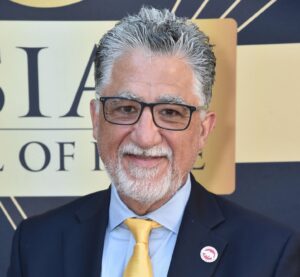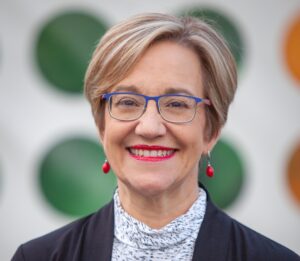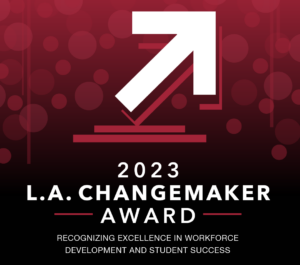
The Future of Work – Messengers & Changemakers
Elected officials weren’t the only participants at Pasadena City College’s (PCC) 5th Annual Future of Work Conference, hosted on October 26th by its Economic and Workforce Development division (EWD):
The three featured Keynote speakers – California Labor Secretary Stewart Knox, Senator Anthony Portantino, and Anne Miskey – brought nuance and insight into the ongoing discussions.
The two assembled panels were populated by notable experts in their fields of education, communications, labor, and industry.
The audience was populated by knowledgeable professionals from a variety of organizations, all of whom are deeply invested in this expanded community conversation and several of whom asked really interesting questions.
The audience also included the recipient of the inaugural California Changemaker Award, Sheris Davoodi of Glendale Community College (seen above with PCC Interim President/Superintendent Dr. Jose A. Gomez), who has spent her career helping students from all walks of life achieve their educational and occupational goals.
This assembly of talent, passion, and intelligence offered many angles and contexts to contemplate the serious subjects at hand.

Keynote Speaker California Senator Anthony Portantino
A long-time supporter of California’s community colleges, Senator Portantino represents California’s 25th State Senate District. His many successful projects include securing $4.5 million for the Glendale CC Virtual Reality & STEM Pilot project and pushing two school safety bills through into law.
In his comments as the Keynote for Panel Two, the Senator encouraged conference attendees to stay flexible and fluid in how they address this myriad of complex EWD issues. He applauds the work being done to expand access to trade jobs. He also sees a need for an expanded education model that facilitates learning and advancement through many modalities, not just the traditional few (2- and 4-year colleges, dedicated trade schools, etc.) currently in use. He suggests focusing on the ultimate goal for the entire sector: what jobs will be available, and how do we train those who will fill those positions? “It’s about the individual … and what they want to achieve for themselves. We need everyone from across the spectrum to have access to these opportunities.”
Senator Portantino’s inclusive message was an apt introduction to the subject matter for Panel Two: Innovating Student Success Systems Change.

Keynote Speaker Anne Miskey, CEO of Union Station Homeless Services
As a bookend to Speaker Stewart Knox, who spoke about the state’s efforts to alleviate the challenges arising in EWD systems and programs, the day’s second Keynote, Anne Miskey, spoke about the people toward whom many of these efforts are directed – community members experiencing homelessness.
A nationally recognized leader in developing strategies and solutions that approach the root causes of homelessness, Ms. Miskey has worked with the country’s most influential leaders, including First Lady Michelle Obama, the White House, and several federal departments, including Housing and Urban Development, Veterans Affairs, and the Department of Labor. She currently sits on several notable boards and committees, as well, including the Los Angeles Homeless Services Authority (LAHSA) Ad Hoc Committee on Women’s Homelessness, the Technical Assistance Collaborative, which focuses on issues of mental health, addiction, and homelessness, and the Steering Committee for the Provider Alliance, a network of over 70 non-profit organizations working on homelessness.
In her work as the Chief Executive Officer of Los Angeles Union Station Homeless Services (USHS), Ms. Miskey sees firsthand the consequences of insufficient economic resources and the impact that circumstance has on an individual. The statistics are alarming:
Every day, there are approximately 2 million people in the state who are at risk of falling into homelessness.
Between 2020 and 2023, the number of homeless individuals in Los Angeles County rose by 9%. (Los Angeles City saw a 10% increase.)
The fastest-growing population within the homeless community are seniors, those 65+ years old who don’t have the financial resources to maintain their previous lifestyle.
The second fastest-growing group of people entering homelessness are families with children. Eight percent of the total homeless number are children under age 18, while 5% are ‘transition’ age – 18 to 24 years.
Approximately 40% of people aging out of foster care will become homeless by age 26, and
A full 30% of college students are either currently either homeless or at risk of becoming so in the near future.
Not only do these unhoused individuals represent escalating burdens on social services and other public resources, but their absence from the labor force represents a significant loss of talent, skill, and initiative that could and should be put to use for their own and the community’s greater good.
Accordingly, Ms. Miskey offered information on existing barriers to improvement as well as possible solutions to the homelessness concern for Conference attendees to consider.
Barriers
She notes that obstacles to progress exist in both the population being served and the agencies that are trying to serve it.
Barriers to Individual Success:
The absence of affordable, convenient training and education centers leaves many people with no options for bettering their economic situation. The current structure of today’s educational system requires students to have the time, money, and opportunity to attend.
The absence of childcare is an extra burden carried by single mothers who are also homeless. Today, 30% of LA County’s homeless are single females, and those with children don’t usually have the financial resources needed to pay for that service.
Barriers to Agency Success:
Ms. Miskey notes the adaptations her agency needed to make to deliver more efficient and effective services. Starting out as an employment-focused organization, the enterprise had to adopt and coordinate a constellation of social services to better meet its constituents’ needs.
A negative cultural mindset also permeates the homeless concern. In too many cases, she says, people who are looking for work and are also homeless are seen to be less desirable as workers, and that perspective certainly impedes the process of finding work for this group.
Possible Solutions
In light of those considerations, Ms. Miskey suggests several avenues that the sector could adopt to ease the homeless problem while also alleviating the unfilled job opening concern.
Create meaningful connections with the unhoused individuals. Providing support and comfort initially (food, shelter, mental health, and addiction services) builds both their internal frame of reference and their trust that their community can help them.
Create equally meaningful connections between the unhoused population and its attendant service providers. Achieving access to entry-level jobs that lead to solid career opportunities is the ultimate goal, so support agencies might consider developing short-term training programs to get their unhoused community members into the work world as soon as possible.
Provide employers with similar support. The USHS has helped many companies hire and sustain new employees who continue to struggle with internal issues. The added support resources allow the worker to retain their job while reducing the unexpected demand on the employer.
Ms. Miskey also followed a comment thread that ran throughout her presentation: the LA region needs not just more affordable housing. It also needs an across-the-board increase in wages and salaries. Too many people in these lower economic sectors must choose between rent and medicine, or child care, or food. Paying them a living wage raises them up into a better life circumstance while also preventing their slide into the morass of homelessness, hopelessness, and despair.
The Inaugural California Changemaker Award
Sheris Davoodi – Programs and Services Specialist – Career Services, Glendale Community College
For 15+ years, Ms. Davoodi has served the student community at Glendale Community College by providing career development services and courses in her roles as the Programs and Services Specialist and Adjunct Instructor. Her hands-on practice shares skillsets and insights for many career and occupational choices, including customer service, business technology, and business management communications. She and her team arm their student clients with soft skills, organizational effectiveness, and computer literacy capacities to facilitate their entry into the ’employee’ sector. For a brief moment, she also held the role of Interim Director for PCC’s Robert G. Freeman Center for Career and Completion.
Her selection as the inaugural recipient of this prestigious honor is well-made and appropriate, considering how many learners have succeeded in their career dreams because of her thoughtful training and mentoring strategies. Congratulations, Ms. Davoodi.



